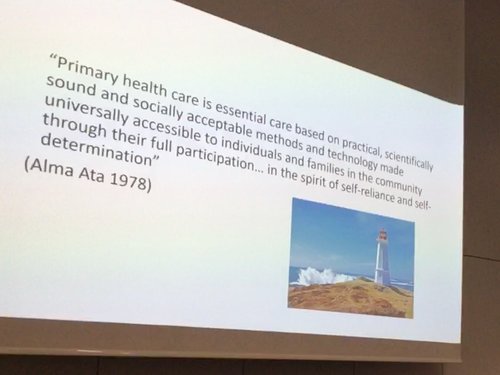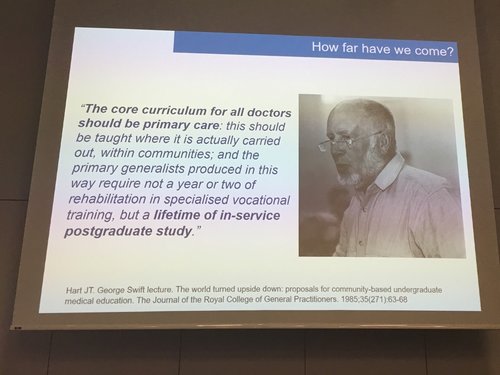14-15th February 2019
The conference was a great way to meet others interested in health inequalities, listen to the experiences of working in this area from some truly inspirational speakers and explore future challenges as well as celebrating many great achievements by GPs and their colleagues across the UK.

One of the opening talks by Professor Allyson Pollock about how market forces affect the inverse care law was an eye opener. She discussed how the inverse care law has been shown to operate more completely where medical care is most exposed to market forces. The introduction via the health and social care act of private providers bidding for healthcare contracts has been seen to exacerbate this. This combined with the current allocation of GP funds being equal but not equitable has led to a decrease in GP services and population health. Currently 5 million people are using food banks in the UK. 11% of GP practices have closed in the last 10 years.
She went on to discuss what we can do as GP’s working at the “deep end” to help in this crisis. Patients in deprived areas are reported to have less opportunity for shared decision making, less time and felt less empathy from health care workers. Patient enablement has been shown to only occur when empathy is expressed. Continuity of care and time are the most influential factors in improving patient care.
We then went on to hear many inspirational stories from different GPs across the UK. We first heard from the Deep End in Scotland, learning about the Govan SHIP project, a program that allowed the employment of locums to free time of salaried and GP partners to focus on providing better care for those more complex patients. They also ran MDT meetings with different members of the healthcare team (social care, mental health, district nurses, health visitors, rehab, link workers) to discuss high need patients and improve co-ordination of care. The GPs were also given time to develop areas of interest and develop leadership roles. Evaluation at the end of the project showed a reduction in appointments and home visits for those complex patients. They also found that many of the locums employed stayed on at the practice improving recruitment. The success of this project echoed Professors Pollocks words about the importance of increased time and continuity of care.
We also heard from the North Dublin training scheme who have developed a specific curriculum for those training within their area focussed on deprivation. This included modules on self-care and change management as well as an arts program. The scheme included a 4th year, when a special interest post could be followed such as working in a homeless, prison or migrant health clinic.
Dr Blane, a Deep End GP, also gave a very interesting talk on the educational challenges faced when training those in areas of health inequalities. His salient points for care of patients in deprived areas were
- Extra time for consultations
- Best use of serial encounters (learn a patients story)
- GP’s as the natural hubs of local health systems (a great opportunity for linking with others)
- Making connections across the front line (sharing learning)
- Better support for the front line (infrastructure)
- Leadership at different levels (at every level)
A discussion on the Wider World impact on health inequalities by Sir Andy Haines also gave a different perspective on how we think about health and our world. Environmental stewardship is a current hot topic and one which I have never considered as directly impacting on the health of the population I see. However hearing statistics such as “1 in 9 deaths globally is caused by air pollution” and that “as the % of carbon dioxide in the air increases the quality and nutritional value of food reduces”, made me think about this again. He also raised the question of whether if people think about environmental changes as impacting their health, would they care about it more?
I also very much enjoyed a break out session where medical students, foundation doctors and early career GPs met to discuss the challenges they faced and ideas they had about future developments in this area. The general feeling was people were doing similar work all over the country and opening communication channels and sharing ideas would be beneficial to everyone.
I went away from this conference feeling inspired and enthused. Although there was much discussion about the current poor state of care provided for those in deprived areas across our country, hearing about the positive steps that had been taken and the passion for development in this area from others was encouraging. The key message I took away from the conference is that the three areas that should be focussed on to provide good care in deep end practices are:

- Continuity of care (getting to know patients better by improving access to appointments, better retention of regular staff)
- More time with patients (more staff to allow this, flexibility of appointments)
- Resilience of GPs and healthcare staff (the importance of self-care measures, allowing time for personal development, supporting staff to avoid burnout).
The importance of recruitment, education and retention in practices really interests me. GPs are now a scarce resource and large numbers of newly qualified GPs are now opting to locum rather than take up a permanent position. Having recently moved from locuming to a salaried position I am aware of how attractive the flexibility and financial incentive of locuming can be. I have also witnessed how brilliant GPs have become burnt out due to the nature and intensity of the work.
Salaried jobs need to become more attractive to younger GPs. By improving GP numbers and resilience by offering more time and space to both consult but also explore areas of self-development (as illustrated by the govan SHIP program) will lead to better retention of staff , continuity of care and ultimately better patient outcomes. Practices need to be able to give GPs the space and time to develop other interests and to do that they require appropriate financial backing from the government.
Dr Katie Burgass
